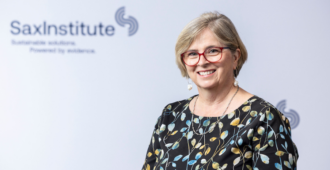
Health services research has a long history of delivering findings that make an important contribution to shaping policies, programs and services. Australia is currently facing extraordinary challenges in providing health and aged care services with the pressures of COVID-19, the rising cost of medicines and treatments, and the growing needs of an ageing population. At this moment in time, there is a unique need for evidence that informs the health system changes that will be needed for the future.
Against this background, the Sax Institute has established a project, the Health Services Research Initiative, to consider the contribution that health services research can make to future-proofing our health system. The project is being guided by:
- Professor Henry Brodaty, Co-Director of the Centre for Healthy Brain Ageing at UNSW Sydney
- Professor Sally Green, Professorial Fellow in the Faculty of Medicine, Nursing and Health Sciences at Monash University
- Professor Jane Hall, Director of Strategy, Centre for Health Economics Research and Evaluation at the University of Technology Sydney
- Professor Rachel Morton, President of the Health Services Research Association of Australia and New Zealand.
The first of a series of Sax Forum events, planned as part of this project, was held on 29 August, 2022 and attended by more than 80 people from Sax Institute’s member organisations. The event was chaired by Sax Institute CEO Professor Sally Redman AO, with Professor Brodaty, Professor Green, Professor Hall and Professor Morton on the panel.
The panellists offered powerful examples of research being used to inform important health service decisions. Professor Jane Hall spoke about research done on the Extended Medicare Safety Net in the years after its launch in 2004. The research, led by Kees van Gool, revealed that the benefits scheme was mostly helping people in high-income areas. This led to an official review in 2009 and changes to the scheme’s structure. “It’s a good example of how well-meaning policy can have unintended consequences,” Professor Hall said. “Academic curiosity is incredibly important in laying the basis for research and evidence that will go into policy.”
Professor Henry Brodaty spoke about the years it can take for research to influence health services. In the late 1980s he did a study on the benefits of dementia-carer training, but it had little impact. The study was updated and repeated 30 years later by Meredith Gresham at HammondCare. By this time, Professor Brodaty had made professional connections within the Department of Health and Aged Care, so he could share the study’s findings with them directly. The result was a $32 million investment in respite care combined with carer education. Professor Brodaty said this was a great example of why researchers need help getting their work translated into action. “We need health economists, we need to meet with the government and funders of service, and the companies providing the service as well.”
Professor Sally Green spoke of the success of the Living Guidelines produced by the National COVID-19 Clinical Evidence Taskforce, a group she is part of. The guidelines have been updated 80 times and are co-produced by experts, peak bodies and consumer groups. It’s a great example of both knowledge synthesis and collaboration, said Professor Green, and could be used in other areas of health. “I think we need to combine academic curiosity with a research-informed understanding of what we know and don’t know,” she said.
The event also focused on future research and how it can best inform health services. There was a highly interactive discussion between panellists and audience members on the following issues:
- Patient-centred health systems. This was considered crucial for future health systems but more work is needed in planning and evaluation. More qualitative research using patient feedback was also suggested.
- Access to large-scale enduring data assets. The existence of multiple health registries in Australia is a step forward but more access to large data sets is needed for researchers to give their work greater impact.
- International collaboration that is equitable and effective. As global collaboration often stems from a researcher’s own career movements, women are disadvantaged; more investment in the right kind of collaboration is needed.
- Research that is embedded in health services. An institutional structure that includes research and evaluation would push innovation forward and give greater value to the work these researchers do.




